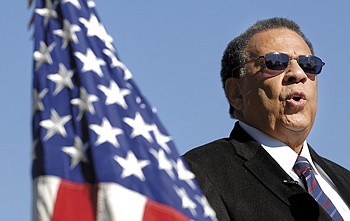DALTON, Ga. - Georgia has more than 1,000 historical markers across the state, noting everything from the ruins of an oceanside beer brewery to Civil War battlefields.
But until Wednesday, there were no markers that note the role that blacks played in the Civil War.
A slew of state officials, Civil War buffs and a civil rights icon descended Wednesday on the scene of two Civil War skirmishes that involved 600 black Union soldiers. The 146-year-old skirmishes were the only two confrontations in Georgia that involved blacks during the Civil War.
"In an inventory, we found that there weren't any markers that mentioned African-Americans," said Todd Groce, president and chief executive officer of the Georgia Historical Society. "Now we want to note the role of African-Americans, women, politics and the struggles on the homefront."
Former Atlanta mayor and United Nations ambassador Andrew Young led the ceremony in Dalton to unveil the marker near Fort Hill School.
"The bloodiest of all America's wars has been the Civil War," Young said. "As we come together to commemorate those who died in an attempt to maintain the unification of this nation, after many years, we have finally realized that we are stronger together than we are separate."
Several hundred spectators attended the ceremony, which pays homage to the 14th and 44th United States Colored Troops companies.
History shows that 600 to 800 black troops comprised the two companies. Left behind to guard the railroad depot in Dalton after Gen. William Tecumseh Sherman's army moved south to Atlanta, the men believed they were literally fighting for their freedom.
The troops faced two combat confrontations with Confederate soldiers, an extremely rare event that happened only twice in Georgia during the Civil War, both times in Dalton.
The Union troops held their ground in the first skirmish in August 1864. But in a second confrontation, up against 40,000 Confederate soldiers fleeing burning Atlanta, the Colored Troops companies were captured. A handful died, some escaped and others were returned to their owners, said local attorney and Civil War researcher Bob Jenkins.
"About 250 managed to break free and go to Tennessee, where they joined the Union to fight in the Battle of Nashville against the Confederate soldiers they faced earlier in Dalton," Jenkins said. "They won there, so it was some measure of vindication."
In Dalton, which is the scene of several historic Civil War events, few knew about the unique role blacks played there, said Curtis Rivers, director of the Emery Center, a Dalton museum dedicated to local history, including that of blacks and American Indians.
"I talked to a woman who is 90 who walked past that site every day," Rivers said. "She had no idea that anything like that happened there.
"It's so important for us to mark the site, so we know and so that young people know what happened there," he said.
ABOUT THE TROOPS
Members of the 14th and 44th United States Colored Troop companies fought to defend a railroad depot in Dalton. It is one of the few instances where blacks saw combat during the Civil War and the only two instances of such confrontation in Georgia.
The troops fended off an initial Confederate attack in August 1864, but when 40,000 Confederate troops returned in October, the white Union commander surrendered, securing paroles for himself and the other 150 white soldiers stationed in Dalton. Some of the black soldiers, however, were forced back into slavery, into work for the Confederacy or killed or beaten.
Roughly 250 of the black troops, however, broke free and joined other Union soldiers in Nashville, where they delivered a defeat to the Confederacy.
Source: New Georgia Encyclopedia
